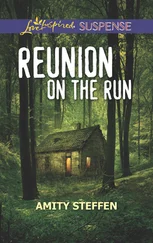“She’ll think I’ve left her,” I wept into my captor’s ear. “She’ll think I abandoned her. I told her I’d be right back! I promised!”
“You are in big fucking trouble, buddy. You’ve got other things to worry about.”
“You don’t understand,” I said. “I don’t care about other things. There are no other things .”
“Calm down. If you stay calm, we can walk out of here. We removed you from the room to avoid upsetting the little girl.”
“But she’ll be upset when she finds out her father is gone!”
“You are not calling the shots.”
“ Please .”
“Pipe down.”
“Then call her mother,” I say.
“She’s on her way. She’s been located. She’s been waiting by the phone for a week.”
“Let me stay until she gets here. I want to explain this all myself.”
“Are you kidding me? Don’t you know you’re all over the news?”
“Call my father. He lives here, in Boston. He’s family.”
“Not on your life.”
I nodded, staring at the hands that covered me.
Then I screamed, “MEADOW KENNEDY! I’M RIGHT HERE! YOUR FATHER IS RIGHT HERE!”
Immediately I was thrown against the wall.
I was pinned. I was crying. I found myself trying to reason with the police officers, but nothing came out except whispers. Amazing how they moved me, dragging me like a child by the underarms. My feet slipped on the linoleum. I tried to keep up, but my emotions — sudden, explosive — scrambled physical sensation. The officers opened the swinging doors with my head, and we were back in the bright solarium, and it was daybreak.
“OK, OK,” I said. “Look. I’m calm now. I’m very calm. Let me walk.”
They paused to look at me, adjusting their grips. We were standing together in front of a semicircle of chairs, a dozen innocent bystanders reading their morning papers, looking on, dumbfounded.
“I’m very calm,” I said. “And I see the police car waiting for me. I will calmly walk right out of here if you could just tell my daughter something for me. I would appreciate it if you would at least give her a message. All right?”
The policeman shrugged.
“Do any of you speak German?”
A look of antipathy from all three of them.
“Good. Then tell her this, please: Ich liebe Dich und werde Dich immer lieben. And tell her, also: Danke. Danke. Es war meine schönste Zeit. 16OK? Please. Please tell her that.”
Again, I’m crying.
“What the fuck.”
“You are a nutcase, buddy. You are in for a world of shit.”
“Tell her . It’s for her .”
“Jesus Christ.”
“Let me write it down,” I cried. “You can give it to her. She’ll understand.”
“Hey,” one of the younger cops said, pushing me through the revolving doors and into the cold air. “How about you do yourself a favor and shut the hell up?”

Unfortunately, there comes a point in every research project where one’s own personal interests are a liability. One loses the scent of the original project, sometimes never to return. For a year or so, I thought I might expand my “Experimental Encyclopedia” to include not just famous silent moments but also famous silent persons or groups of silent persons. 17But I got hung up on one thing or another, for example some fascinating and finally fruitless investigations about Abbas Diadochus, fifth-century bishop of Photiki. As I had throughout my project, I found myself less interested in the breadth or completeness of my research and more interested in the curlicues of interesting shit I learned paging through moldering books and obsolete science.
At the same time, the researcher is a searcher . He never quite knows what he’s looking for, or why. After I accepted the essential dilettantism of my project, I still mulled over its subject with genuine wonder. In the beginning, I thought silence was generic. But soon I saw the inverse. Sound was generic. Sound was obvious . But silence. There were so many forms of it. Principled silence. Practical silence. Necessary silence. Ritual silence. Religious silence. The silence of incalculable grief.
Let me expand:
PRINCIPLED SILENCE
Pythagoras himself was not a silent man, but back in ancient Greece, he taught legions of young men about the rigors of silence. He called his students “listeners.” For five years at a time, Pythagoras’s students observed complete silence. Their teachers would ask them questions they were prohibited from answering, and these questions banged around in their heads for five years, so that by the time their silence was over, you can bet they had some hefty answers. Of course, once the students graduated, they found themselves at a stark conversational loss with everyone they had known before. People wanted the listeners to explain what they’d learned by being silent for five years. But you just really couldn’t explain pure silence. It was like trying to send a parcel of light through the mail. And anyway, why should there be a shortcut? If you want to understand, why don’t you stop talking for half a decade? It was soon decreed among Pythagoreans that it was not lawful to extend to the casual person things which were obtained with such great labors and such diligent assiduity .
Tell me about it.
THE SILENCE OF FEAR
In the Gulag, a brilliant middle-aged woman who had once been a music teacher in a noted Baltic conservatory was serving a decade of hard labor for some transgression against the Communist Party for which she was never formally charged but was sure she was guilty of anyway. Some sort of thought crime, some manifestation of her rage. After long days of crushing big rocks into smaller rocks with a medium-sized rock, the woman would spend her free time in the barracks working on her pet project — a silent piano. She made the body of the piano out of a previous prisoner’s wooden crate. The keys she labored on for months apiece, filing down thin planks and tongue depressors. The box was solid, as were the keys — white and black — as responsive as real piano keys. It’s just that the instrument didn’t produce sound. Well, at first it didn’t. And then one day she was able to play the entirety of the Handel Variations. She realized that she had developed an ability to create silent music. And thereafter, long after she returned to her life of privation, she always referred to herself, much to the surprise of others, as “lucky.”
THE SILENCE OF SOLITUDE
Hermits and recluses fall into this category, though you could also call their silence principled, practical, or ritual. On a personal note, years ago, after a long depression, my friend — the buddy from Loudonville, whose Mini Cooper I stole — decided to go live in the desert for a while, to see if it would help him. He’d recently lost his parents, his girlfriend had left him, and it was just a bad time. That, plus he was born sad. So he went to the desert. He brought a tent, many books, sufficient water and food. During the day, he sat and listened to the silence. Now, he had expected it to be silent in the desert. But he was surprised at how quickly the silence began to gnaw at him. He felt that he was being confronted by the essential indifference of the cosmos. And so, to his chagrin, he started making up little songs, things like “You Don’t Love My Big Toe” or “Someone’s Abusing My Appliances.” These songs embarrassed him not because they were polluting the silence he had come to study, but because they were so childish. After a while, my friend packed up his things and headed home. He had learned something. He didn’t know what he had learned, but he felt better.
Читать дальше













